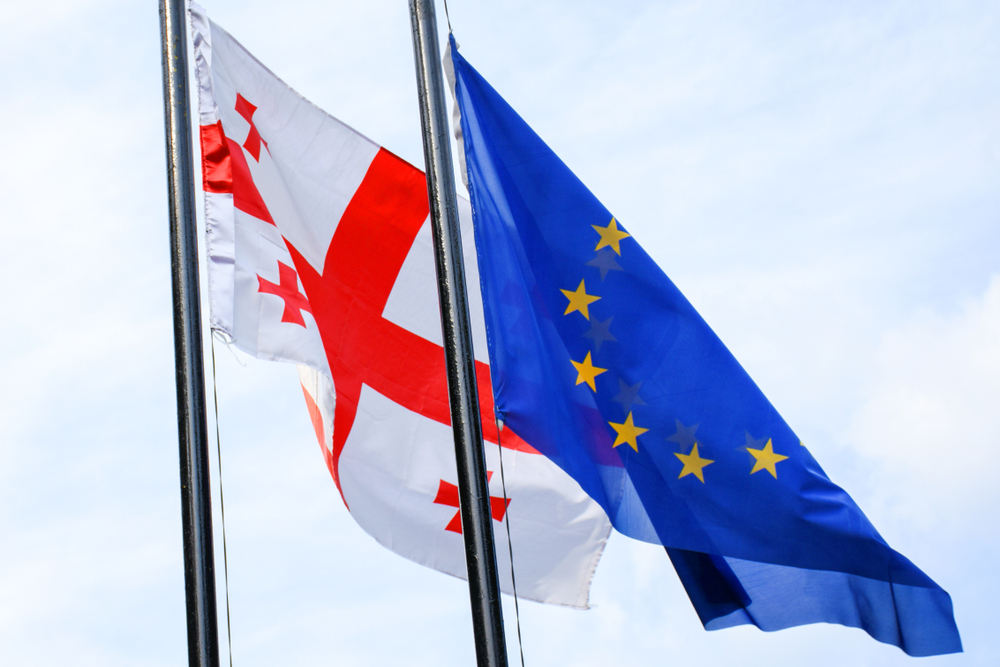
BACKGROUND: This pivotal moment places Georgia in a precarious situation, challenging its dedication to democratic principles and influencing its foreign policy direction, thereby amplifying uncertainties regarding the country’s political and institutional future. Being granted candidate status could present several opportunities for both Georgia and the EU. For Georgia, this outcome could spur new political dynamics, fostering an environment more conducive to the democratization and Europeanization of the country. Achieving the status could stabilize Georgia’s political landscape, empower pro-reform actors, reduce polarization and party-led radicalization, enhance the country’s international reputation, and render the Europeanization process and reform agenda more difficult to reverse. With candidate status, Georgia may be more motivated to implement the necessary reforms to progress to the subsequent phase.
For the EU, this development would augment its influence over Georgia’s reform initiatives, boost its transformative power, counter anti-EU disinformation, and enhance its geopolitical standing in the strategically pivotal South Caucasus and Black Sea regions. Especially, in the context of the EU’s strategic absence during the Nagorno-Karabakh crisis, maintaining a strong presence in Georgia could be a key pillar of EU geopolitical influence in the region. Granting candidate status to Georgia is also likely to send a clear signal to Russia about the irreversible nature of Europeanization in Georgia. It can also potentially strengthen Georgia's resilience against the malign influences of not just Russia, but also China. Additionally, this move can help foster stability in the region and promote the democratization process.
Moreover, the effectiveness of the EU’s democratic conditionality arguably increases when incentives are perceived as more attainable, particularly for the general public, which keeps pushing the Georgian government every time it derails from the EU integration path. The EU can apply democratic conditionality more effectively when it adheres to a strict timetable and the subsequent steps are imminent. Conversely, without candidate status, the prospect of European integration for Georgia may appear more abstract and unattainable in the short term.
IMPLICATIONS: Even though the EU seems motivated to grant Georgia candidate status despite insufficient performance from the government, there is no guarantee that the Georgian Dream (GD) government would react by expediting democratic reforms and progressing to the negotiation stage. The GD’s lack of political will to deliver on reforms could still be considered a stumbling block for Georgia’s further democratization. Candidate status might also prove insufficient motivation for the GD government to abandon its anti-reform agenda and anti-Western rhetoric. Conversely, it might exploit this development to enhance its public standing, undermine the opposition, and secure a landslide victory in the 2024 parliamentary elections. If the government chooses this path, it will likely exacerbate polarization and radicalization, entrench authoritarianism, divert Georgia from its path towards European integration, and increase susceptibility to Russian malign influence. In short, giving candidate status to Tbilisi is not without risks.
Another risk accompanying Georgia’s potential candidate status lies in the country’s current foreign policy trajectory that ostensibly seeks to balance relations with the EU and its policy of stealth bandwagoning with Russia. There is no guarantee that this status would motivate the Georgian government to pull away from Russia and reorient itself towards the EU. In the worst-case scenario, the GD government could exploit the candidate status to secure victory in the 2024 parliamentary elections without altering its foreign policy trajectory, currently characterized by the facilitation of increasing Russian influence in Georgia and anti-Western rhetoric.
The GD might persist in diversifying its foreign policy, veering towards more illiberal actors beyond Russia. A potential outcome could be an intensification of its strategic partnership with China, established in a recently signed agreement. Should Georgia maintain its Russia-accommodating policy and advance further towards EU membership, the EU will risk having another Russian “Trojan Horse” among its ranks, similar to countries like Hungary and potentially Serbia.
Given Georgia’s tumultuous recent history, highly adversarial political culture, and a high degree of political radicalization, the EU and other external actors might need to play a more significant role, by assisting both government and opposition forces in Georgia to agree on new rules that transcend the zero-sum mentality currently afflicting Georgia’s political system. As Georgian democracy faces increasing challenges, the only way to stabilize the country is to support a multi-party political system and institutionalization of a consensus-based democratic process. Georgia’s political landscape is likely to remain fluid and unpredictable. Given the upcoming elections and the unpredictable nature of Georgian politics, forecasting specific developments is a challenging endeavor.
CONCLUSIONS: The European Commission’s decision to grant Georgia EU candidate country status is a significant accomplishment that can potentially drive further changes. This status allows Georgia to align itself with Ukraine and Moldova, potentially bridging the gap and revitalizing the country’s recent lack of progress on the reform agenda. It is important to note, however, that there is no guarantee that this status alone will motivate the Georgian government to abandon its anti-reform approach or its anti-Western rhetoric, or to distance itself from Russia. The EU encounters challenging decisions as it seeks to maintain support for Georgia’s democracy and European aspirations in the face of a government that is progressively displaying illiberal tendencies. In this delicate situation, Brussels needs to find creative ways of safeguarding its geopolitical interests without emboldening emerging authoritarianism in Georgia. Regardless of the EU’s decision, it is crucial to uphold the Copenhagen criteria and enforce strict democratic requirements on Tbilisi. Particular attention should be given to monitoring the Georgian government’s adherence to the recommendations outlined by the EU. The stakes are significant, with repercussions extending beyond Georgia to encompass the entire region.
AUTHOR'S BIO: Kornely Kakachia is Professor of Political Science and Jean Monnet Chair at Ivane Javakhishvili Tbilisi State University, Georgia, and Director of the Tbilisi-based think tank Georgian Institute of Politics. He is co-editor of the book titled “Georgia’s Foreign Policy in the 21st Century: Challenges for a Small State” (London, New York: I.B. Tauris, 2021).



